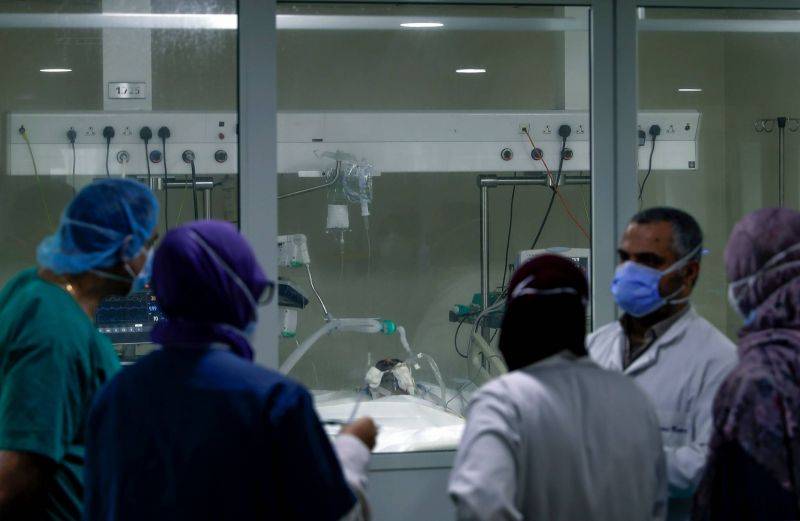
The COVID-19 pandemic has exacerbated demand for certain types of medical supplies, but dollars to import them are running low. (Credit: Joseph Eid/AFP)
BEIRUT — For over a year, the importers of medical equipment and devices have been relying on Lebanon’s central bank to provide them with the dollars they need to bring in the materials essential to health care treatment.
Now, Banque du Liban’s dollar reserves are drying up and it appears to be failing to make good on its promises. The Medical Equipment & Devices Importers Syndicate says that nearly $60 million of invoices have been pending for more than four months.
And so, these importers have delivered BDL a stark warning: pay our bills or companies will stop importing.
Since the end of September 2019, BDL has subsidized medical equipment, pharmaceuticals, fuel and wheat. Importers provide 15 percent of their total invoices in US dollars and 85 percent in Lebanese lira, which BDL converts to dollars at the official exchange rate in order to pay foreign suppliers.
This October, the policy was restricted further, requiring importers to provide the lira portion up front in cash.
However, Salma Assi, the head of the importers’ syndicate, told L’Orient Today that BDL is no longer honoring its promises of dollar facilities “with no guarantee that they will pay.”
Since the beginning of the year, she continued, only around 60 percent of bills have been settled.
As bills rack up, international supply companies “are telling us that if we don’t pay by the end of the year, they won’t deliver,” Assi said. “This will have a huge impact on the quality of care — there are many products that are only produced in Europe or America and can’t easily be replaced.”
Halim Berti, a spokesperson for BDL, said that the central bank was providing commercial banks with the dollars required, and that the problem was between the banks and the importers, not BDL.
However, Assi insisted that importers do not have any issues with commercial banks.
BDL’s governor, Riad Salameh, has said that there are only enough dollars remaining at the central bank to continue funding subsidies through January. Meanwhile, authorities are scrambling to come up with a plan to reallocate and retarget subsidies to support the country’s poorest populations.
Assi said that BDL’s third vice governor, Salim Chahine, had told importers at a meeting last week that they could not commit to paying the invoices before year end because they “don’t know if they have the funds and don’t know what items will be subsidized.”
Chahine did not respond to multiple requests for comment.
The consequences of an end to medical imports — whether due to international suppliers ceasing deliveries or local companies stopping importing — could be disastrous.
“The importers are the start of our supply chain,” said Youssef Fakih, the general manager of the Fakih Hospital near Sarafand. “If they don’t bring the supplies, quite simply we won’t be able to treat patients — everything will stop.”
Hospitals are already suffering from equipment shortages due to financial constraints and the rationing of supplies from importing companies, forcing them to reschedule non-emergency services or reduce bed capacity.
“We have had to limit what we’re giving to hospitals,” Assi said, explaining that many companies have stock that is essentially on loan from suppliers and are unwilling to sell it before bills are settled.
“This is equipment we haven’t paid for yet, so we will have to give it back if we’re asked.”
Bilal Obeid, an orthopedic surgeon who works in two hospitals in south Lebanon, said rationed supplies and rising prices have already limited the choice of treatments he offers to patients. He is worried about that if supplies stop coming altogether, their lives will be put at risk.
“We are heading in a worrying direction, and I don’t think people realize how bad it’s going to get,” he said.
At Beirut’s St. George Hospital University Medical Center, commonly known as Mustashfa Roum, there is enough stock to continue running for a few months, said Jean Abou Mrad, the hospital’s materials manager.
The hospital was one of the most severely damaged in the Aug. 4 Beirut port explosion, forcing a 30 percent reduction in the facility’s number of beds. One unexpected consequence of the decreased capacity, Abou Mrad said, is that the stock of supplies can stretch a little further.
“But if stock is no longer imported, there’s going to be a major crisis,” he said. “We’re not only talking about supplies and medical tools, we’re also talking about parts. What do you do if a scanner breaks down?”
There are 160 medical importing companies in Lebanon, 126 of which are linked to the syndicate, according to Assi. Their products range from basic essentials, such as syringes and gauze, to CT scanners and blood testing machines.
“These are advanced, technically demanding pieces of equipment we are talking about,” said Firass Abiad, the head of Rafik Hariri University Hospital. “The health sector simply cannot work without them.”
At Fakih Hospital, doctors are “able to manage” for the moment, Fakih said, as they still have over 80 percent of the supplies they need in stock. But this stock, he estimated, is only enough to last another month.
“If we reach a point when our supplies run out, what am I meant to tell our patients when they come to us in pain?” he asked. “That they just have to live with it?”
“This is a really scary thought.”